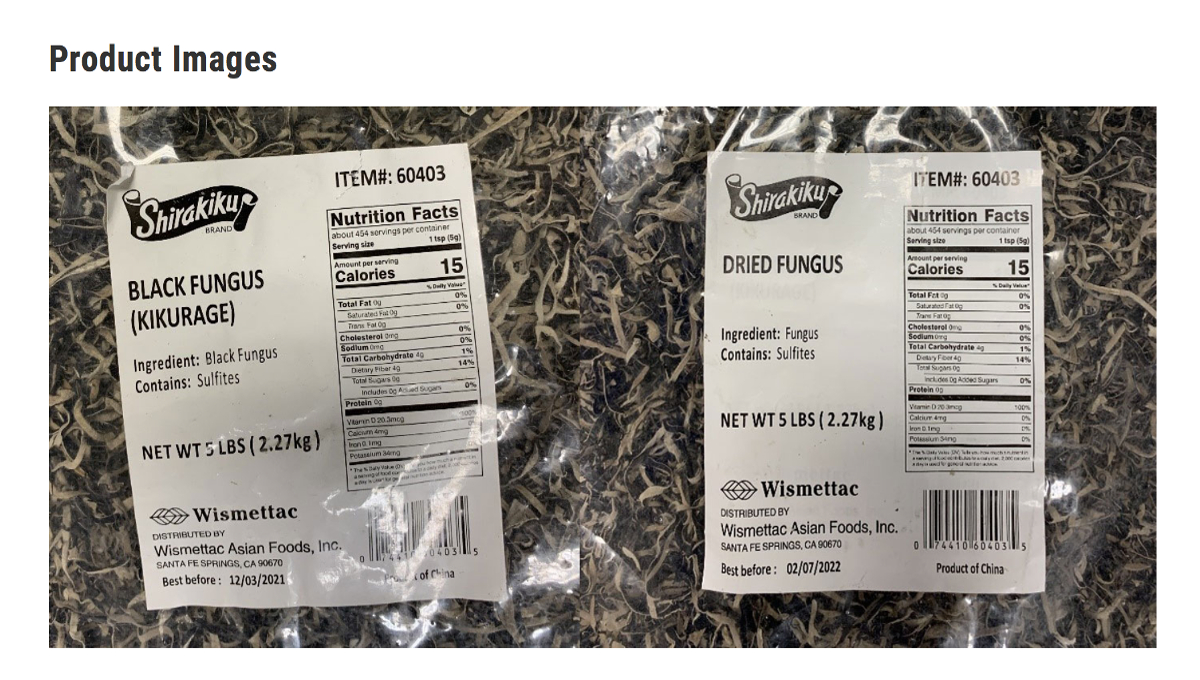Federal officials continue to report new illnesses in a 10-state Salmonella outbreak linked to imported, contaminated wood ear mushrooms, also known as kikurage or black fungus.
Officials reported yesterday there have been 43 patients confirmed in the outbreak, up from 41 in previous reports from the Centers for Disease Control and Prevention’s epidemiologists and investigators at the Food and Drug Administration. No one has died, as far as agency authorities know. Four outbreak patients have been admitted to hospitals.
Inc., Santa Fe Springs, CA, has recalled Shirakiku brand imported dried fungus, also known as wood ear mushrooms, black fungus or kikurage, from restaurants in 31 states, the District of Columbia and one Canadian province.
The recall came following the California Department of Public Health’s discovery of the presence of Salmonella in the product. The manufacturer has been made aware of the issue, and is conducting an investigation to determine the cause of the issue so corrections can be implemented, according to a recall notice posted by the FDA.
Officials with Wismettac Asian Foods Inc. reported distributing the fungus to restaurants in Arkansas, California, Colorado, Connecticut, Delaware, Washington DC, Florida, Georgia, Hawaii, Iowa, Illinois, Indiana, Louisiana, Massachusetts, Maryland, Michigan, Minnesota, Missouri, Mississippi, North Carolina, Nevada, New Jersey, New York, Ohio, Oregon, Pennsylvania, South Carolina, Tennessee, Texas, Virginia, Washington, Wisconsin and British Columbia in Canada.
“Wood ear mushrooms imported by Wismettac Asian Foods Inc. were only sold to restaurants and were not available directly to consumers. Although these items have been recalled, concerned or high-risk individuals should check with their restaurant to confirm that any wood ear mushrooms that have been used or are being used are not part of this recall,” the FDA advised in its previous outbreak update.
Wood ear mushrooms are also commonly referred to as Kikurage, Dried Black Fungus, Dried Fungus, or Mu’er/Mu Er/Mu-Err, according to the CDC. The public health agency is advising anyone who has such food on hand to throw it away unless they know for sure it is not subject to the recall.
The company reports that the mushrooms were distributed to restaurants in six packs of 5-pound bags labeled as Shirakiku brand Black Fungus (Kikurage) with Universal Product Code (UPC) bar code 00074410604305, item #60403, and imported from China.
Clusters of ill people have been identified in relation to several restaurants. Many of them reported eating wood ear mushrooms or ramen containing wood ear mushrooms in the week before their illnesses started.
“FDA and states are conducting a traceback investigation to identify the source of the wood ear mushrooms eaten by ill people. Review of records collected to date identified that Wismettac Asian Foods Inc., supplied wood ear mushrooms (dried fungus) to the illness cluster restaurants,” according to the CDC’s outbreak announcement posted today.
“The California Department of Public Health collected dried fungus at one of the restaurants linked to an illness cluster for testing. Testing identified Salmonella in a sample of dried fungus distributed by Wismettac Asian Foods Inc. (Whole genome sequencing) analysis is being done to determine if the Salmonella identified in the dried fungus is the same as the Salmonella from ill people.”
A wide range of people are listed as outbreak patients specifically reported eating wood ear mushrooms in the days before becoming ill. Their illnesses began between Jan. 21 and Aug. 26, according to the CDC’s update.
Ill people range in age from 2 to 74 years old. Of 32 ill people with information available, four hospitalizations have been reported.
Illnesses might not yet be reported due to the time it takes between when a person becomes ill and when the illness is reported. This takes an average of two to four weeks.

